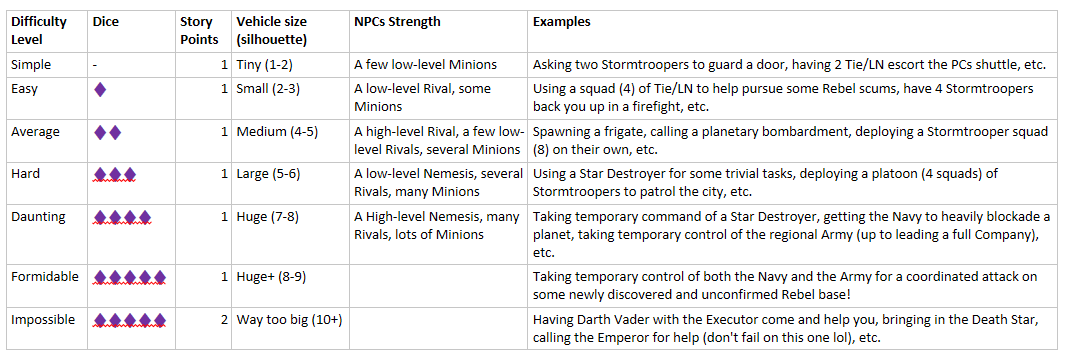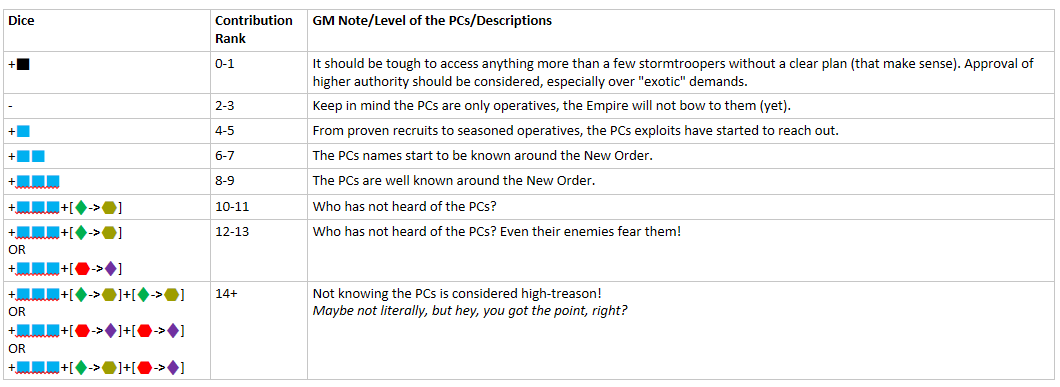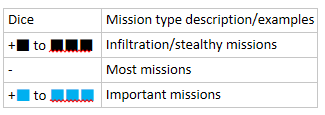This is an untested work in progress.
As Imperial Agents, players have access to all kind of imperial perks!
We could divide these perks into two categories:
- Human resources
- Material resources
Some resources are easier than others to access… In this document, we will focus on the “human resources” aspect and how the PCs can control imperial troops during their adventures.
Military operations
Sometimes, the PCs might want to do some more impressive stuff than assigning 2 Stormtroopers to guard a door, like calling a Star Destroyer to blockade the escape of some Rebel operatives. I will call those most impressive display of power: military operations.
To start a military operation, the players must:
- Flip a Story Point
- Then roll a Team Presence skill test against a difficulty set by the GM
- The difficulty is based on the number of resources and the risks involved in the operation.
If the player succeeds, the military operation starts, troops follow PCs orders, etc. If they fail, well the officer in charge had something else to do, find the idea ridiculous or something else that makes sense for the current situation.
Team Presence is a team skill, so if the check fails, another PC cannot try again right away. The GM discretion is advised here.
Team Presence
The Team Presence skill represents the social skills of the group. In game terms, it is based on their projected authority, credibility and reputation and how other Imperials respond to it.
To encourage diversity in the group, all players pick one social skill to represent their contribution to the Presence pool.
Social skills: Charm, Coercion, Deception, Leadership, Negotiation
The team presence rating is divided into two parts: the skill and the attribute ratings, which end up like building any other dice pool. Note that there is no need to keep track of both the skill and the attribute ratings separately, only keeping track of the “Team Presence dice pool” should be fine.
- The skill rating is equal to the average of the chosen social skills ranks of all players attending the game session.
- The attribute rating is equal to the average of the chosen social skills’ attributes of all players attending the game session.
So yes, the Team Presence dice pool may vary from game session to game session.
To avoid recalculating the Team Presence rating for every encounter, you should use the default linked attribute; otherwise, feel free to link whatever attribute you see fits best, as per the Genesys system optional rule.
Example:
Based on the following party:
- Player 1 choose Charm (Presence) and has a rating of 2 (2)
- Player 2 choose Coercion (Willpower) and has a rating of 1 (2)
- Player 3 choose Deception (Cunning) and has a rating of 1 (2)
- Player 4 choose Leadership (Presence) and has a rating of 2 (3)
The calculation goes as follow:
- The sum of all skill ranks is 6 (2+1+1+2)
- The sum of attributes ranks is 9 (2+2+2+3)
- The number of players is 4
- The average skill rank is 1 (6/4=1.5 rounded down = 1)
- The average attribute rank is 2 (9/4=2.25 rounded down = 2)
- The dice pool is then 2 + 1 upgrades for a final dice pool of .
Another example:
Based on the following party:
- Player 1 choose Charm (Presence) and has a rating of 4 (2)
- Player 2 choose Coercion (Willpower) and has a rating of 4 (3)
- Player 3 choose Deception (Cunning) and has a rating of 3 (3)
- Player 4 choose Leadership (Presence) and has a rating of 5 (4)
The calculation goes as follow:
- The sum of all skill ranks is 4+4+3+5=16
- The sum of attributes ranks is 2+3+3+4=12
- The number of players is 4
- The average skill rank is 16/4=4
- The average attribute rank is 12/4=3
- The dice pool is then 4 + 3 upgrades for a final dice pool of
Who does not want free troops?
The most obvious use of Imperial resources would be troops! As Imperial Agents, on most Imperial worlds, the PCs can easily order any Stormtroopers to execute some simple actions like to guard a door or call in a Tie fighter escort for their shuttle without requiring anybody’s permission. The PCs should not hinder any bigger plans by doing this though.
Military operations difficulty
The following table is only a guideline and must be treated as so. It is in no way a strict way of assembling the difficulty dice pool of a specific task.

Team Contribution Ranks
TODO: rephrase the first paragraph; ranks are acquired individually not "as a group".
Based on the Duty system of AoR, the team Contribution Rank increase as a group. Even players playing imperial agents should focus on teamplay; the team want the New Order to succeed and will do anything in their power to see that happen (collectively)!
The following table describes the benefits of each rank. The perks in that table do not require any roll (unless the GM decide otherwise). But, aiming for higher gear or resources than your rank allows usually do.

Adjustments
As with everything else, situation and location tend to change the difficulty of a task.
Team Contribution Rank Bonuses
The higher the contribution rank of a character, the easier it is to get obeyed by troops and officers alike. At some point, you have done so much that you became well known and respected (or feared) throughout the Empire (and the rebels).

Milieu
Depending on the milieu, having backup could be easier or harder.
Example: getting a squad of Stormtroopers to guard some doors on a remote planet can be tricky if the place is already understaffed!

Mission type
Based on the mission assigned to the PCs, it could run from forbidden to highly recommended to call for help.
Example: during the infiltration of a rebel base, calling Stormtroopers for help is impossible; there is no Stormtrooper on the base; it is a Rebel base!

Spare some change?
Both the GM and the PCs can trade or for an upgrade or a downgrade.
ADD SOME EXAMPLES HERE
The GM factor
(based on the GM schemes)
Depending on the circumstances, the GM can allow players to use a lot of resources if it makes sense for the specific scene or narrative or forbid the use of resources. These rules are to create an imperial feel to the game, not to disrupt it.
See also the Mass Combat rules, related to Team Presence Talents below.
Spending symbols
Spending and

Spending and

The Setbacks
Of course, using the Imperial Armada sounds easy and fun, but getting too many troops killed for nothing or failing a massive scale operation will not be quickly forgotten by the Imperial Authority affected and might end up with severe sanctions!
Example: crashing a Star Destroyer on a planet just for fun will most likely cost somebody his life (or force the team to start a new career as Rebel Scums)!
Team Presence Talents
To get better results, PCs can invest their contribution rank into Team Presence Talents. This is complementary to the usual rewards; The PC can have a reward and a Team Presence Talent Point (TP²). These special talents can be applied to the Team Presence skill checks to affect its effectiveness. Each player buys Team Presence Talents individually.
The concept is the same as the characters’ talents: you must have more lower level ranks than the rank you want to purchase (see Genesys talents rules for more info). The higher rank is 3.
As an example, one player could specialize in the army, while another PC could focus on the navy.
Buying Team Presence Talents
When acquiring a new Contribution Rank, a player can buy a Team Presence Talent (TPT) as well as choosing a reward (see Alliance Rewards p. 50 AoR).
The variance used in the campaign is: Average-speed reward variance
Average-speed reward variance
Each TPT’s rank cost 1 contribution rank reward. Ex.: rank 1 cost 1, rank 2 cost 2 and rank 3 cost 3.
Assuming that the PC spent all his points in the Team Presence Talent system, this ruleset will allow a contribution rank 16 to have:
- 2 rank 3 talents
- 3 rank 2 talents
- 4 rank 1 talents
Fast reward variance
Talents of rank 1 and 2 cost 1 contribution rank reward while rank 3 talents cost 2 Ex.: rank 1 cost 1, rank 2 cost 1 and rank 3 cost 2.
Assuming that the PC spent all his points in the Team Presence Talent system, this ruleset will allow a contribution rank 11 to have:
- 2 rank 3 talents
- 3 rank 2 talents
- 4 rank 1 talents
Super-fast reward variance
Any talent cost 1 contribution rank reward. Ex.: rank 1 cost 1, rank 2 cost 1 and rank 3 cost 1. But you must have two level one before buying a level two anyway…
Assuming that the PC spent all his points in the Team Presence Talent system, this ruleset will allow a contribution rank 9 to have:
- 2 rank 3 talents
- 3 rank 2 talents
- 4 rank 1 talents
List of talents
See Team presence talents for a list of talents.
Mass Combat Variance
To be revised
The Team Presence Talents will directly impact any mass combat the PCs are participating in! See “Onslaught at Arda I” p. 30 for more information about mass combat rules.
Unless otherwise specified in the talent description, the following rules apply:
- Upgrade the ability of the dice pool once per rank 3 talent own by PCs. This represents the added force’s tactics, organization, and morale, provided by the PCs reputation, participation, and leadership.
- If no PC possess any rank 3 talent, sum all of the ranks of all of the PCs, then divided that number by 9 (or 7 or 6 depending on the variance used), rounded down, then add time the resulting number to the dice pool.
- Ex.: if 4 PCs spent 4 ranks into Team Presence Talents, the sum is 16 (4x4=16). Then divided by 9, rounded down, equal 1. Add to the dice pool.
- Ex.: if 4 PCs spent 5 ranks into Team Presence Talents, the sum is 20 (4x5=20). Then divided by 9, rounded down, equal 2. Add to the dice pool.
NPCs Talents (GM)
These talents are used only by NPCs. These are GM facilitators (like the Adversary talent).
For player talents, see Team presence talents.
Enemy
Tier: 1
Activation: Passive
Ranked: Yes
The enemy has a name, and the New Order troops know it!
Upgrade the difficulty of all Team Presence skill check by 1 per rank in Enemy.
I Kicked your big brother’s ass
Tier: 1
Activation: Passive
Ranked: Yes
Prerequisite: This talent should only be assigned to Nemesis or powerful recurring Rivals.</header>
Past defeats have an impact on our future decisions. Don’t doubt yourself, but hey! I did kick your big brother’s ass!
During mass combat, upgrade the difficulty of the dice pool a number of times equal to the “I Kicked your brother’s ass” rank.
</section>